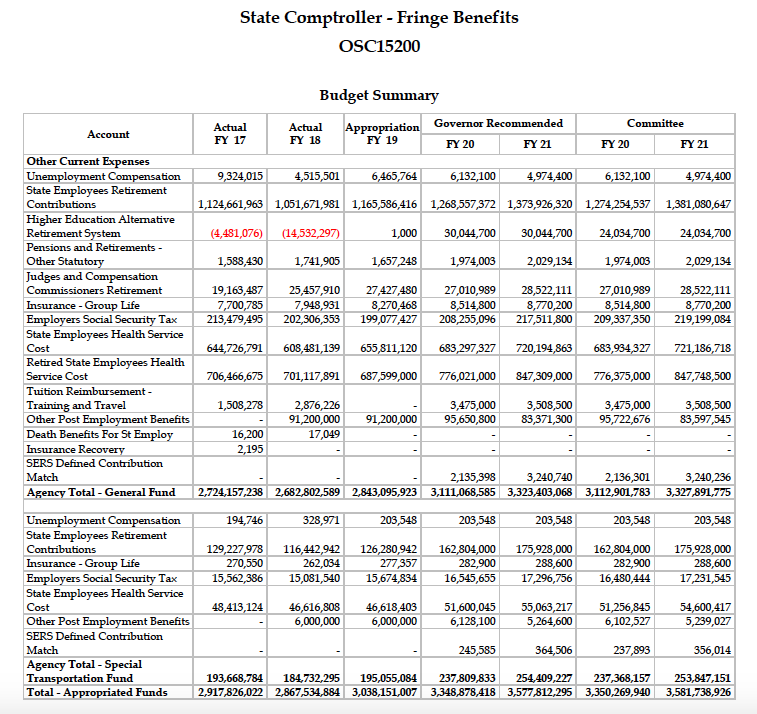The Appropriations Committee released its state funding recommendations Tuesday, which showed a $544 million dollar growth in fringe benefit costs for Connecticut state employees between 2019 and 2021.
The Appropriations Committee budget recommendations largely fell in line with Gov. Ned Lamont’s budget and reflects the growing cost of Connecticut’s State Employee Retirement System, which requires an additional $200 million over the next two years to make up for the state’s unfunded pension liabilities.
Health care costs for current state employees is budgeted to increase by $64 million and costs for retired employee health care is set to grow $159.7 million between 2019 and 2021.
The remaining increases come from a variety of different benefit sources in smaller amounts.

Fringe benefit costs are weighing heavily on Connecticut state agencies including the Department of Transportation and Connecticut’s higher education system and have lawmakers searching for ways to raise revenue or increase tuition for Connecticut students.
The cost of fringe benefits for Department of Transportation employees paid for through Connecticut’s Special Transportation Fund have increased more rapidly than any other expense over the past 18 years. The Appropriations Committee budget shows those costs will increase from $195 million in 2019 to $254 million by 2021.
The governor is pushing for tolls on Connecticut’s highways to bolster the STF, but the increased costs are also affecting students in Connecticut’s higher education system.
The growth of fringe benefit costs has put increased pressure on the Connecticut State Colleges and Universities System to increase tuition for students and has received at least some of the blame for escalating costs at UConn Health.
Connecticut’s Board of Regents which governs Connecticut’s state university and community college system is once again saying they will have to raise tuition rates to help cover the costs.
Fringe benefits for UConn have reportedly increased by over $100 million since 2011 and the increases are affecting UConn Health’s ability to get research grants.
The growth in fringe benefit costs, coupled with increasing employee salaries negotiated through the 2017 SEBAC agreement with Gov. Dannel Malloy and Connecticut’s constrained budget means more of the costs are falling directly on students and – potentially – commuters if tolls are enacted and approved.
Currently, fringe benefit rates for non-hazardous duty state employees is 64.4 percent of payroll. That figure increases to 88.4 percent for hazardous duty employees and 97.9 percent for judges and compensation commissioners, according to the State Comptroller’s Office, but that rate has been steadily increasing.
Payments to the State Employee Retirement System are expected to continue increasing over the coming years to $2.2 billion by 2024 before leveling off under a debt re-structuring Malloy enacted in 2017.
Pensions and fringe benefits are part of the state’s “fixed costs” which make up 53 percent of the state budget, leaving little room for other state services.
Lamont proposed an expansion of the state sales tax to more products and services as well as enacting tolls, maintaining a corporate surcharge and taxing hospitals to fill Connecticut’s budget deficit.
Although the Appropriations Committee largely determines how Connecticut spends its money, the Finance, Revenue and Bonding Committee determines how the state raises its revenue to fund its various agencies and programs.
The Finance, Revenue and Bonding Committee is expected to release its revenue recommendations this week.

